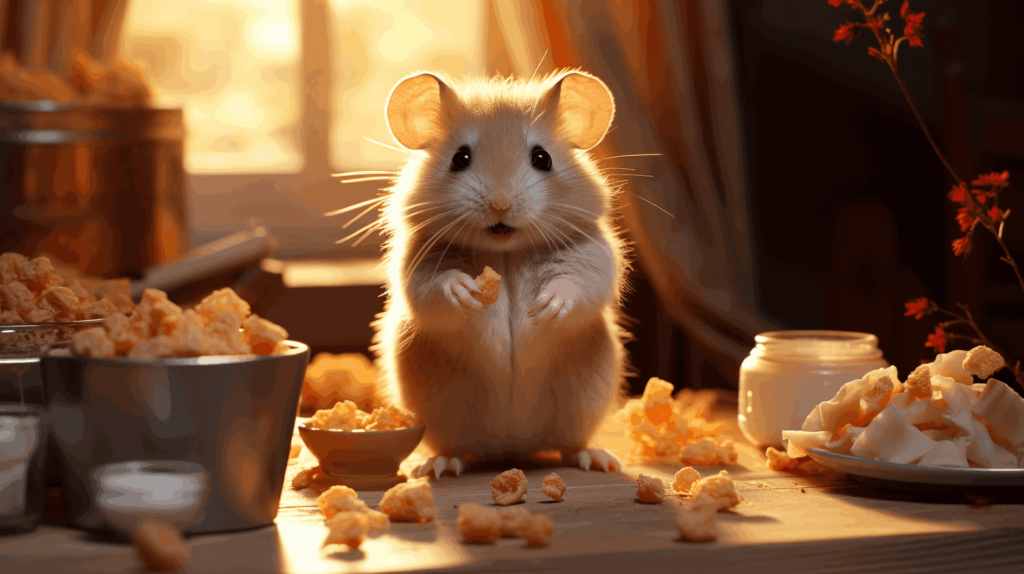Are you curious about whether horses can safely consume popcorn?
This question has piqued the interest of equine enthusiasts, considering the popularity of popcorn as a snack for humans. While popcorn does contain type-1 resistant starch, which can provide energy for horses, it should only be fed as a treat due to its high starch content.
Moreover, horses with certain medical conditions should avoid popcorn altogether. In this article, we will explore the suitability of popcorn as a dietary option for horses, highlighting potential risks and offering informed recommendations.
Key Takeaways
- Popcorn can be given to horses as a treat or to liven up their diet.
- However, horses with certain medical conditions should avoid popcorn, as it can worsen their conditions.
- Regularly consuming popcorn can lead to excessive starch consumption, which can cause digestive disturbances and potentially serious health issues like colic and laminitis.
- Popcorn with flavorings like butter and salt should not be given to horses, as they can contain ingredients that horses cannot tolerate or can be harmful in excessive amounts.
Health Benefits of Popcorn for Horses
While there are potential risks associated with feeding popcorn to horses, it is important to consider the potential health benefits that may be derived from incorporating popcorn into their diet, such as the provision of energy through its type-1 resistant starch content.
Popcorn contains type-1 resistant starch, which is a complex carbohydrate that provides a slow and steady release of energy. This can be particularly beneficial for horses that require sustained energy during activities such as endurance riding or working.
Additionally, the fiber content in popcorn can aid in digestion and promote a healthy gut environment. However, it is crucial to note that popcorn should only be fed in moderation as a treat, as excessive starch consumption can lead to digestive disturbances and potentially serious health issues such as colic and laminitis.
Risks of Feeding Popcorn to Horses With Medical Conditions
Feeding popcorn to horses with medical conditions can potentially exacerbate their health problems, so it is important to exercise caution and avoid it as a treat.
While popcorn can provide energy for horses due to its type-1 resistant starch content, excessive starch consumption is not healthy for them. Horses with conditions such as PSSM, RER, insulin resistance, obesity, or glucose-induced excitability should avoid popcorn altogether, as it can worsen these medical issues.
Excessive starch can lead to digestive disturbances, colic, laminitis, and behavioral changes in horses. Additionally, popcorn with flavorings like butter and salt should not be given to horses, as butter contains dairy, and excessive salt consumption can be toxic.
It is also important to avoid feeding horses cheese-topped popcorn, as horses are lactose intolerant.
Digestive Disturbances From Excessive Popcorn Consumption
Excessive consumption of popcorn can result in digestive disturbances, such as colic and laminitis, in horses. Horse owners need to understand the potential risks associated with feeding popcorn to their equine companions.
To convey a deeper meaning to the audience, consider the following bullet points:
- Popcorn contains type-1 resistant starch, providing energy for horses.
- However, popcorn should only be fed as a treat due to excess starch not being healthy for horses.
- Horses with certain medical conditions should avoid popcorn, as it can worsen their symptoms.
- Popcorn with flavorings like butter and salt should be avoided, as they can be harmful to horses.
The Link Between Excessive Starch and Colic in Horses
Regularly consuming excessive starch, such as in the case of overfeeding popcorn, can lead to colic in horses. Colic is a term used to describe severe abdominal pain in horses and can range from mild discomfort to life-threatening conditions.
When horses consume excessive starch, it moves from the small intestine to the hindgut, where it is fermented by bacteria. This fermentation process produces lactic acid, which can disrupt the balance of the gut and lead to colic.
Additionally, excessive starch consumption can also increase the risk of laminitis, a painful inflammatory condition affecting the hooves.
Therefore, it is important for horse owners to be aware of the potential risks of overfeeding popcorn or any other starch-rich food to their horses. Proper diet management and moderation should be practiced to ensure the well-being of the horses.
Dangers of Flavored Popcorn for Horses
A limited amount of flavored popcorn, such as caramel or chocolate-coated, can pose potential risks for horses due to the presence of ingredients like dairy or excessive sugar.
Flavored popcorn may seem like a tempting treat to share with our equine companions, but it is important to consider the potential dangers it can present.
Here are four key points to bear in mind:
- Dairy Ingredients: Horses cannot tolerate dairy products like butter or cheese due to lactose intolerance. Giving them popcorn with these flavorings can lead to digestive issues such as diarrhea.
- Excessive Sugar: Flavored popcorn often contains excessive amounts of sugar, which can be harmful to horses. Sugar consumption can contribute to conditions like insulin resistance and obesity.
- Salt Toxicity: Some flavored popcorn may be heavily salted, and while horses can consume salt in moderation, excessive salt intake can lead to salt toxicity, causing symptoms like diarrhea, increased urination, and colic.
- Behavioral Changes: Flavored popcorn can also result in behavioral changes in horses. Excessive starch consumption from popcorn can cause starch to move from the small intestine to the hindgut, producing lactic acid. This can lead to colic and behavioral disturbances.
Considering these risks, it is best to avoid sharing flavored popcorn with horses and opt for healthier treats that are specifically formulated for their dietary needs.
Safety of Unpopped Kernels for Horses
Unpopped popcorn kernels pose no risk to horses and can be safely consumed without any harm. Horses can eat popcorn without having to worry about the presence of unpopped kernels. These kernels, although a common nuisance when eating popcorn, do not pose any danger to horses.
There is no need to pick out the unpopped kernels before giving popcorn to horses. This means that horse owners can confidently offer their equine companions a bowl of popcorn without meticulously removing any unpopped kernels. Horses can safely consume popcorn, including the unpopped kernels, as a special treat or to liven up their diet.
No special precautions are needed when it comes to unpopped kernels and horses, making popcorn a safe and enjoyable snack option for our four-legged friends.
Why Horses Should Avoid Cheese-Topped Popcorn
Given the lactose intolerance of horses and the potential for diarrhea, horses should steer clear of cheese-topped popcorn, as it can be detrimental to their digestive health. However, this raises a broader discussion about the overall suitability of popcorn for horses. Here are four key points to consider:
- Popcorn contains type-1 resistant starch, which can provide energy for horses. However, it should only be fed as a treat due to the excess starch not being healthy for them.
- Horses with certain medical conditions, such as PSSM, RER, insulin resistance, obesity, or glucose-induced excitability, should avoid popcorn as it can worsen these problems.
- Excessive consumption of popcorn can lead to digestive disturbances, excessive starch intake, and the production of lactic acid in the hindgut. This can result in colic, laminitis, and behavioral changes in horses.
- Flavored popcorn, particularly those with butter and salt, should be avoided as they can contain dairy or excessive amounts of salt, which can be harmful to horses.
Lactose Intolerance and Diarrhea in Horses
Frequently, lactose intolerance in horses can lead to diarrhea, making it crucial to avoid feeding them dairy-containing foods like cheese-topped popcorn. Lactose intolerance is a common condition in horses, especially those over the age of three. Foals are less likely to be affected but should still avoid cheese-topped popcorn.
Lactose intolerance occurs when horses lack the enzyme lactase, which is responsible for breaking down lactose, the sugar found in milk products. When lactose is not properly digested, it can ferment in the gut, leading to gas, bloating, and diarrhea. Therefore, it is important for horse owners and caregivers to be aware of this intolerance and to avoid providing horses with dairy-containing foods, including cheese-topped popcorn.
Instead, it is recommended to offer horses a balanced and appropriate diet that meets their nutritional needs without causing digestive disturbances.
Risks for Foals and Cheese-Topped Popcorn
While foals may be less likely to be affected, it is still risky to feed them cheese-topped popcorn due to their lactose intolerance. Foals, like adult horses, have difficulty digesting lactose, the sugar found in milk and dairy products. Feeding them cheese-topped popcorn can lead to digestive issues such as diarrhea, especially in foals over the age of three.
It is important to consider the following points when it comes to feeding popcorn to horses:
- Popcorn with flavorings like butter and salt should be avoided, as butter contains dairy that horses cannot tolerate, and excessive salt consumption can lead to salt toxicity.
- Unpopped popcorn kernels are not dangerous for horses to eat, so there is no need to pick them out before feeding popcorn.
- Regularly consuming popcorn can result in excessive starch consumption, leading to colic, laminitis, and behavioral changes in horses.
Conclusion: Guidelines for Feeding Popcorn to Horses
To ensure the well-being of horses, it is important to follow these guidelines for feeding popcorn.
- Popcorn can be a source of energy for horses, but it should only be given as a treat due to its high starch content.
- Horses with certain medical conditions, such as PSSM, RER, insulin resistance, obesity, or glucose-induced excitability, should avoid popcorn altogether, as it can worsen their conditions.
- Excessive consumption of popcorn can lead to digestive disturbances, as well as the movement of starch from the small intestine to the hindgut.
- This can result in lactic acid production and potentially cause colic, laminitis, and behavioral changes.
- Flavored popcorn, such as those with butter and salt, should also be avoided, as dairy and excessive salt can harm horses.
Conclusion
In conclusion, while popcorn can provide energy for horses, it should only be fed as a treat due to its excess starch content. Horses with certain medical conditions should avoid consuming popcorn altogether to prevent exacerbating their health issues.
Excessive popcorn consumption can lead to digestive disturbances, colic, and laminitis. Flavored popcorn with ingredients like butter and salt should be strictly avoided. Consideration should also be given to the risks for foals when feeding cheese-topped popcorn.
It is important to follow guidelines and make informed decisions when including popcorn in a horse’s diet.
[Rhetorical Device: Parallelism]


